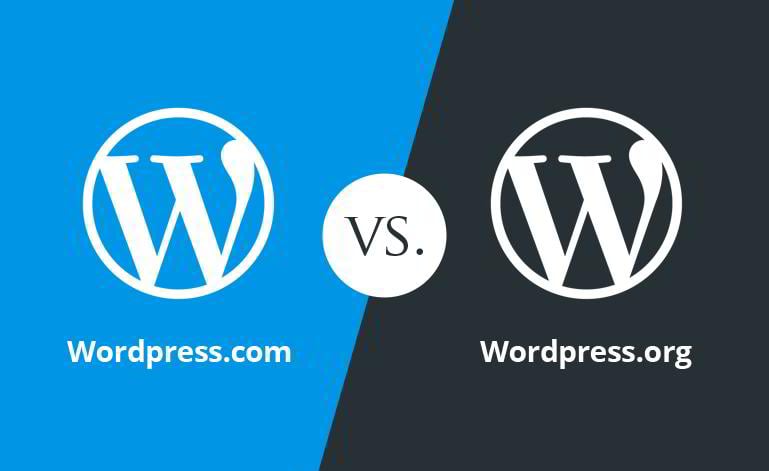WordPress.com or self hosted WordPress? What’s the difference?
What is better for a new site? WordPress.com or WordPress.org? That’s an ongoing debate. In this guide we’ll try to help you decide which one is better for your online success story.
You’ll Learn About:
- What is WordPress.com?
- What is WordPress.org?
- Pros and cons of WordPress.com
- Pros and cons of WordPress.org
- Which one is the perfect choice for you?
First of all let's figure out what’s the difference between WordPress.com and WordPress.org.
1. What is WordPress.com?
WordPress.com is a hosting space created by WordPress. It’s free of charge if you don’t take too much space, don’t use your custom domain name and don’t have access to customizing your design. Basically, it’s just a blogging platform like Google’s Blogger but with more themes. You can purchase a lot of additional features for your site there as well.
2. What is WordPress.org?
WordPress.org is a non-commercial site where you can download the WordPress engine and install it on your hosting service. It requires a little more effort than simply registering on wordpress.com.
But let’s compare WordPress.com and self-hosted WordPress sites. Which one do you want for your online project - the simple WordPress engine hosted on one of the popular hosting services or a free blog on WordPress.com?
In this guide, I’ll try to make the choice easy and clear for you.
3. Pros and cons of WordPress.com
WordPress.com provides one of the quickest and easiest instruments to start your site. Setting up a site there is as easy as creating an account in a social network. You sign up and choose your domain name. That’s it. It’s a decent blogging platform choice, which takes good care of protecting your site and its content. Even if your site gets hacked for some reason, you can easily restore it from backups the system does regularly for you.
On the other hand, if you use a free plan with wordpress.com, you will wind up with a site URL that looks like that: your-domain-name.wordpress.com. To me that doesn’t say “I’m a proud site owner.”
For an additional fee, you can purchase a domain name without wordpress.com at the end. That will cost a little more than .com domain names regularly do, about $20. Note that domain names that end with custom extensions like .tv or your own one may cost much more than standard .com and .net.
One of the big arguments for wordpress.com is that you get up to 3gb of space for free to try and launch your first blog. You can use it to learn WordPress online to see if you’re into it or not. However, in case you later wish to move your site to another hoster, you will need to put in quite a bit of effort.
If you want to learn WordPress to see whether you like it or not, I recommend installing it on your computer to test it totally free for as long as you like. This is called working on localhost. The reason I recommend localhost over WordPress.com is that I decided to do what users do very rarely - read the WordPress.com Terms of Service page.
I’ll list what new users need to know before opting for WordPress.com:
- WordPress.com save themselves the right to display advertisements on your blog. But if you want to make some money yourself, you’ll be able to do so only with WordAds if your site gets more than 25000 hits each day. In addition, what will be wordpress.com’s share in your profit? A whopping 50%.
- With the free plan, FTP/Cpanel access to your files is not available. In case you’ve bought a special plan from wordpress.com for $30, you can edit only the CSS files of your site. Even though you might not feel like that’s a problem now, at some point you’ll need to edit or replace some of your own files and you won’t be able to.
- You aren’t free to use plugins or themes other than the ones developed by wordpress.com partners. And if you use their theme, they have the right to disable it any time they decide you violate some of their numerous rules. Moreover, inability to use external plugins limits possibilities of developing your blog.
- You are responsible for all the activities on your site. Meaning, if you violate User Guidelines in any way, your site can be banned without any explanation. Even if anyone posts an inappropriate comment on your site, you can lose all your data and the site you worked on.
All things considered, if you simply want a blog to share your content and you don’t care about custom design or URL, WordPress.com can probably fit your needs. After all it does have quickest and easiest set-up process and you’ll learn to moderate it really fast.
4. Pros and cons of WordPress.org
The main disadvantage people see in using a self-hosted WordPress is that you need to install it yourself, but it’s not true anymore. Even if you don’t feel like creating a database or uploading engine files yourself, up-to-date hosting providers have “quick installation” of all the most popular website engines.
Using a regular hosting provider like GoDaddy, Bluehost or HostGator, you get used to all the things you can easily do there. For example, none of the WordPress.com restrictions mentioned in this guide before apply to any modern independent hosting.
The most important thing you get with self-hosted site is full control of your data. You choose when to back up your site, you are free to edit, add, replace files on your domain, or in your WordPress Dashboard.
Without any additional fees, you can access your CSS and PHP files in your Appearance -> Editor Dashboard section. Any plugins or themes from any providers on the web are at your service and ready to be installed and used.
5. Which one is for you?
WordPress.com and self-hosted WordPress are serving different goals. The first one is for the most basic blogging, and the second one is for really creating a site. You just need to ask yourself a question, which of those two sounds more like your future site and go with it.
If you decide to go with WordPress, we have the richest selection of WordPress templates for you to choose from. Go get one!
Jeff Bell
Jeff is a 20 year old Tech Support Operator at TemplateMonster. Helping our clients to edit and customize their sites every day, he knows what they need most and how to make it as easy as possible. More than one satisfied client already promised to call their child after him. Being a semi-professional high jumper in the past Jeff leaves no issue unresolved.

